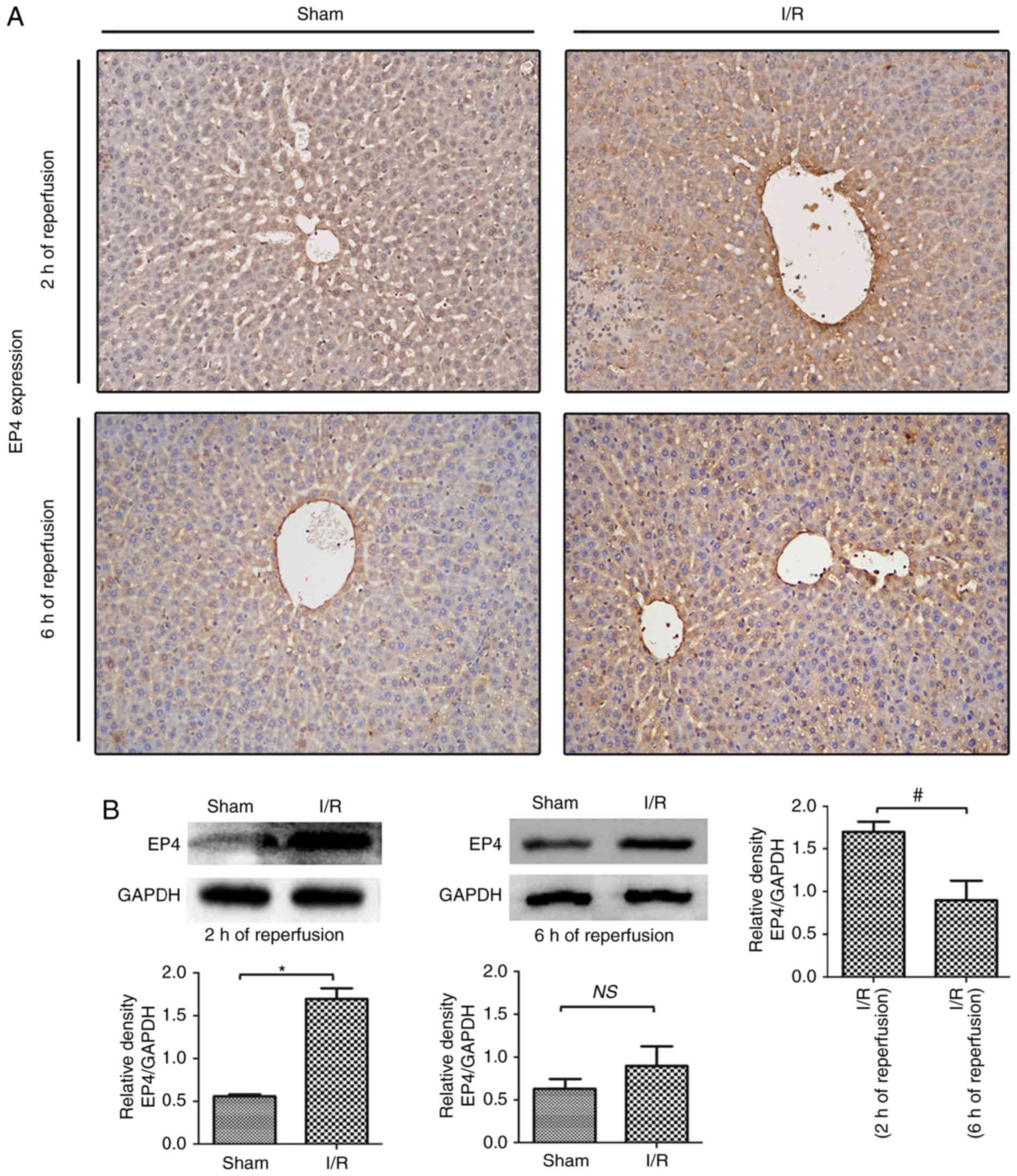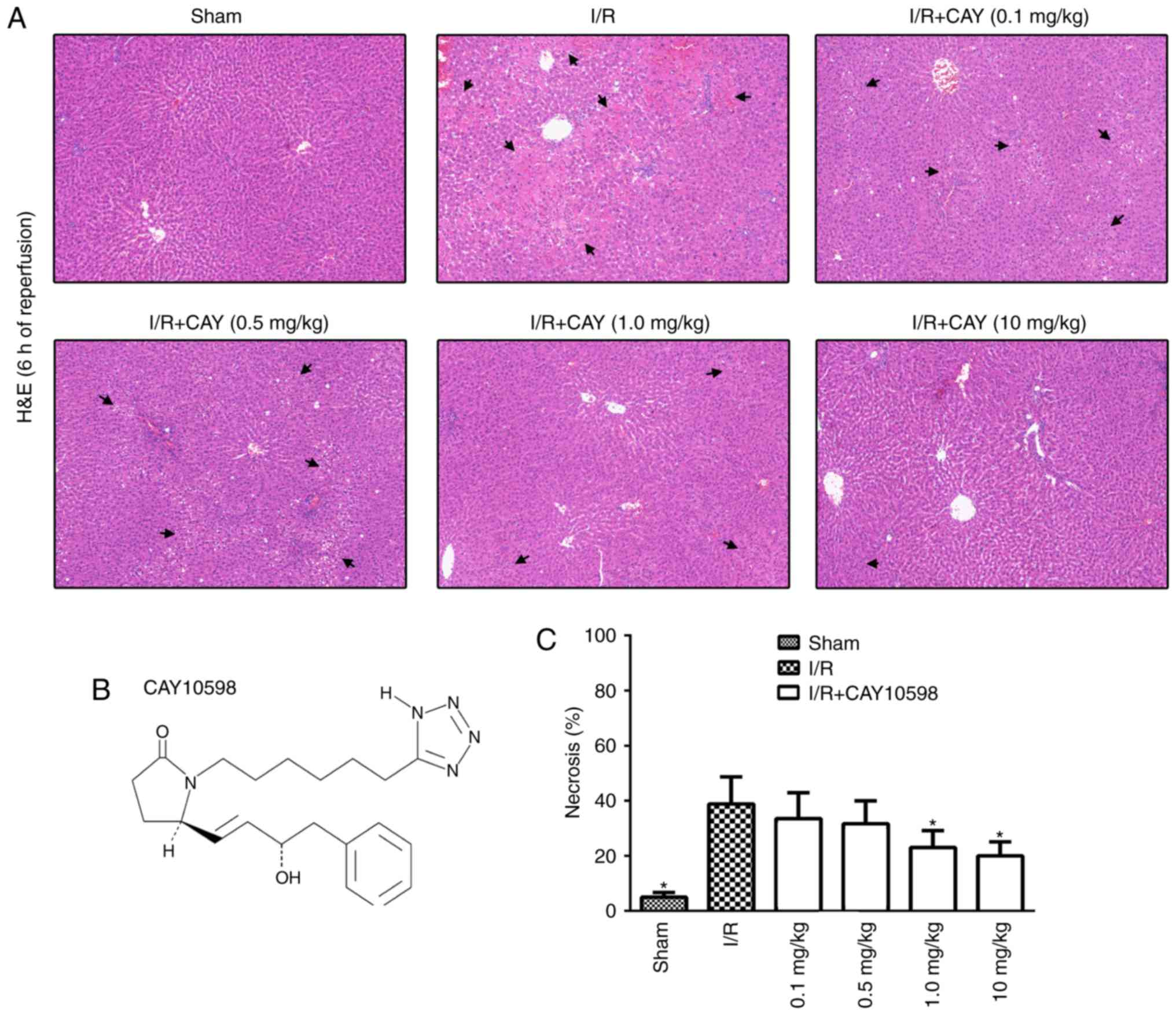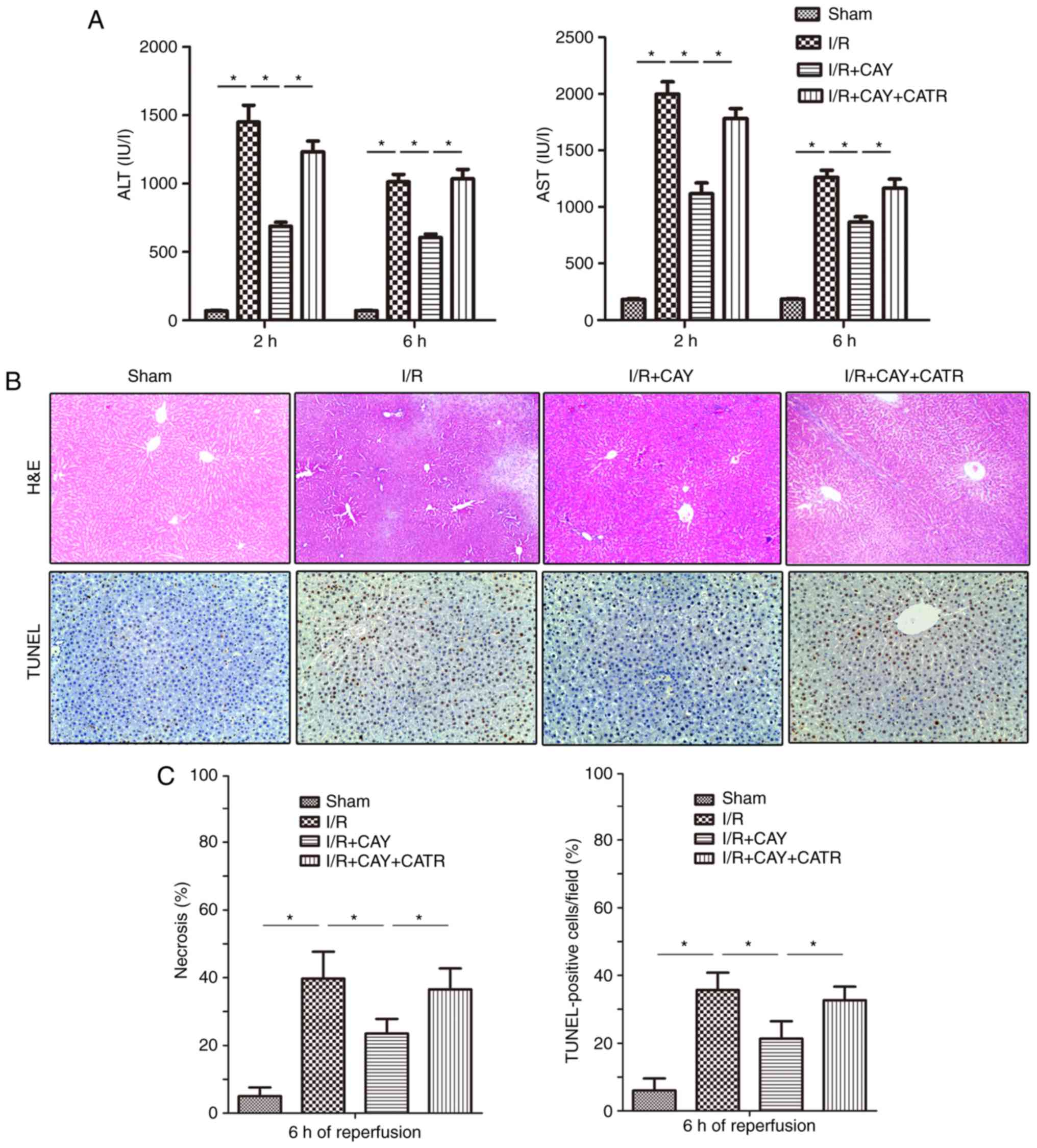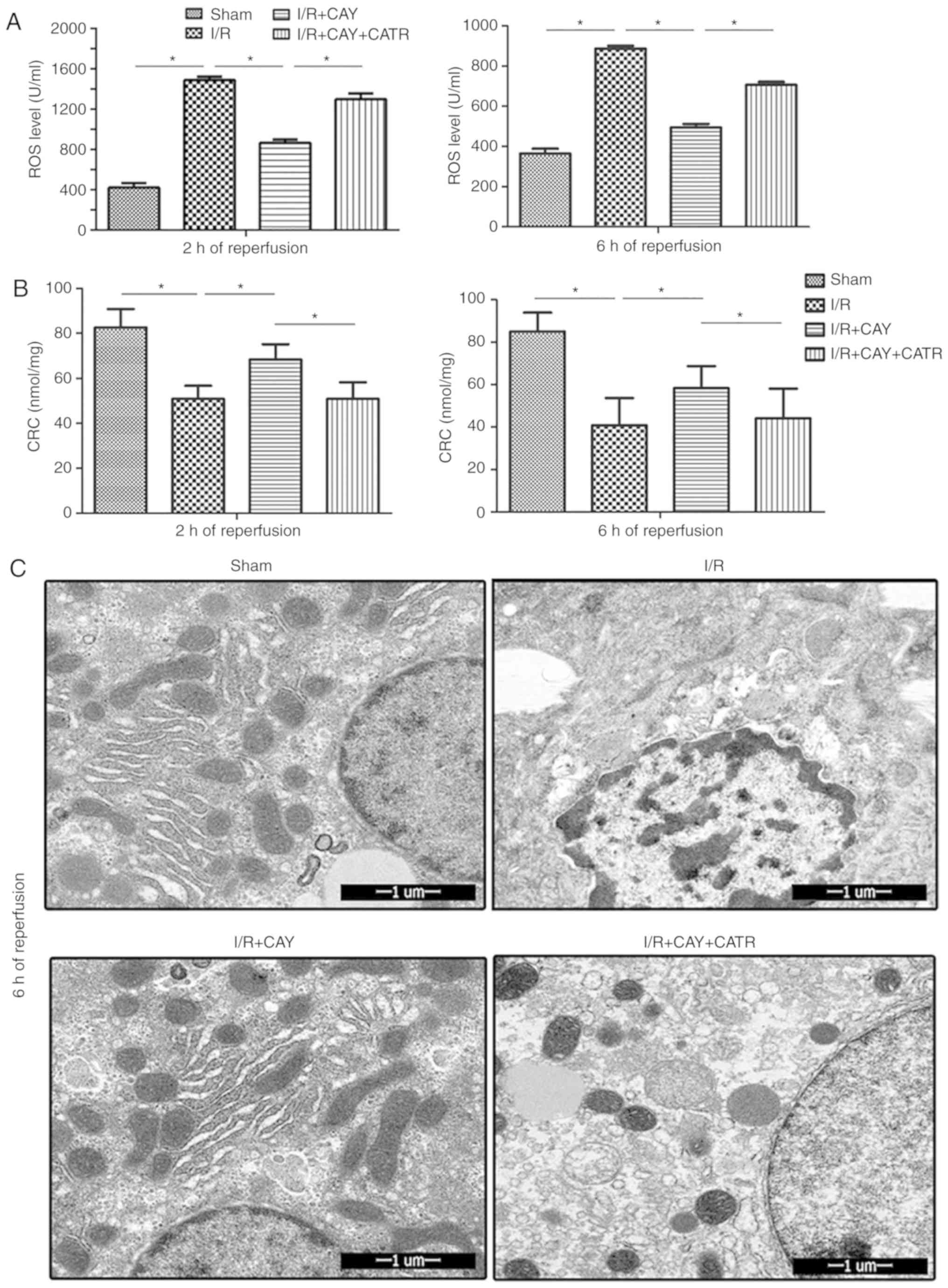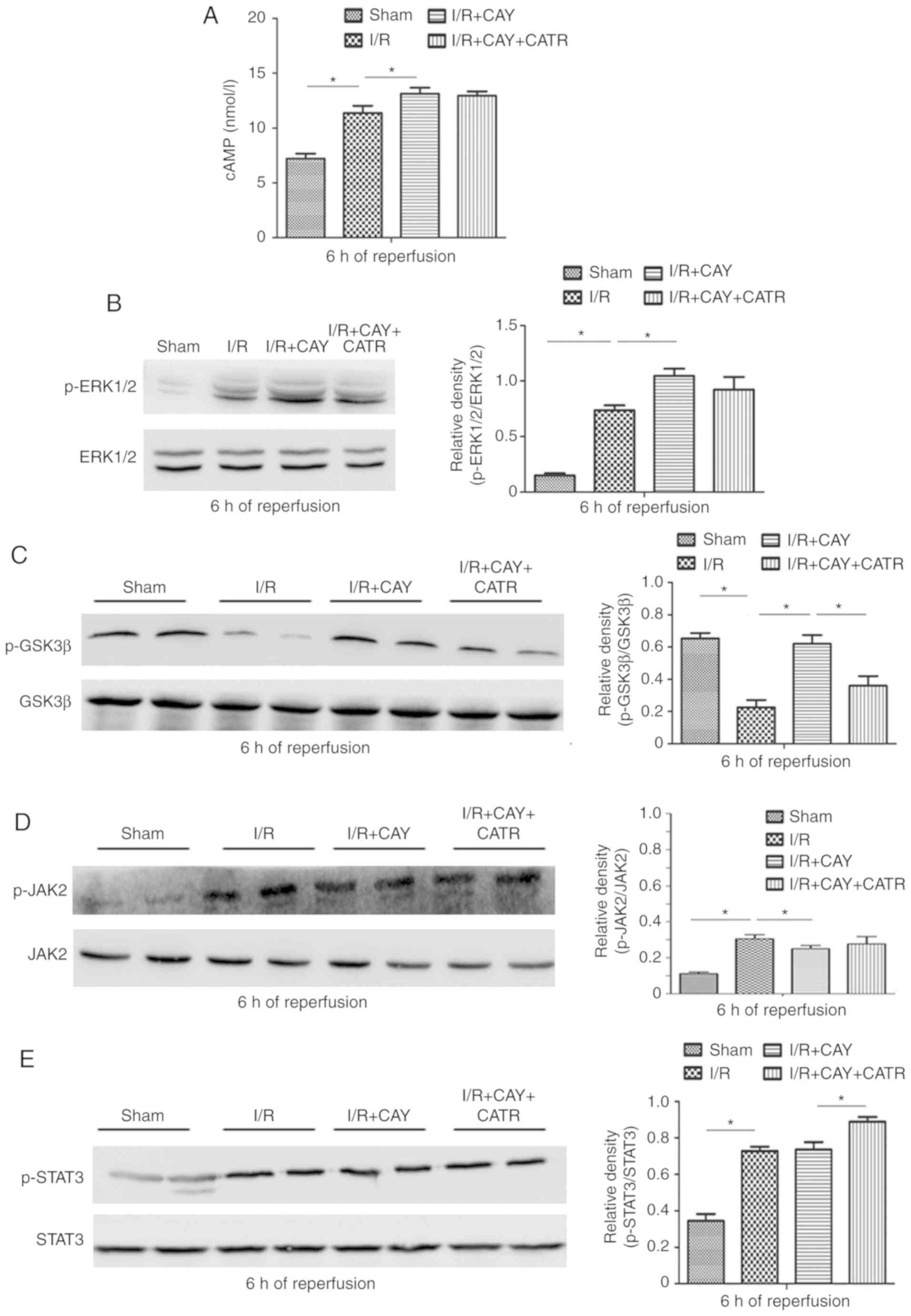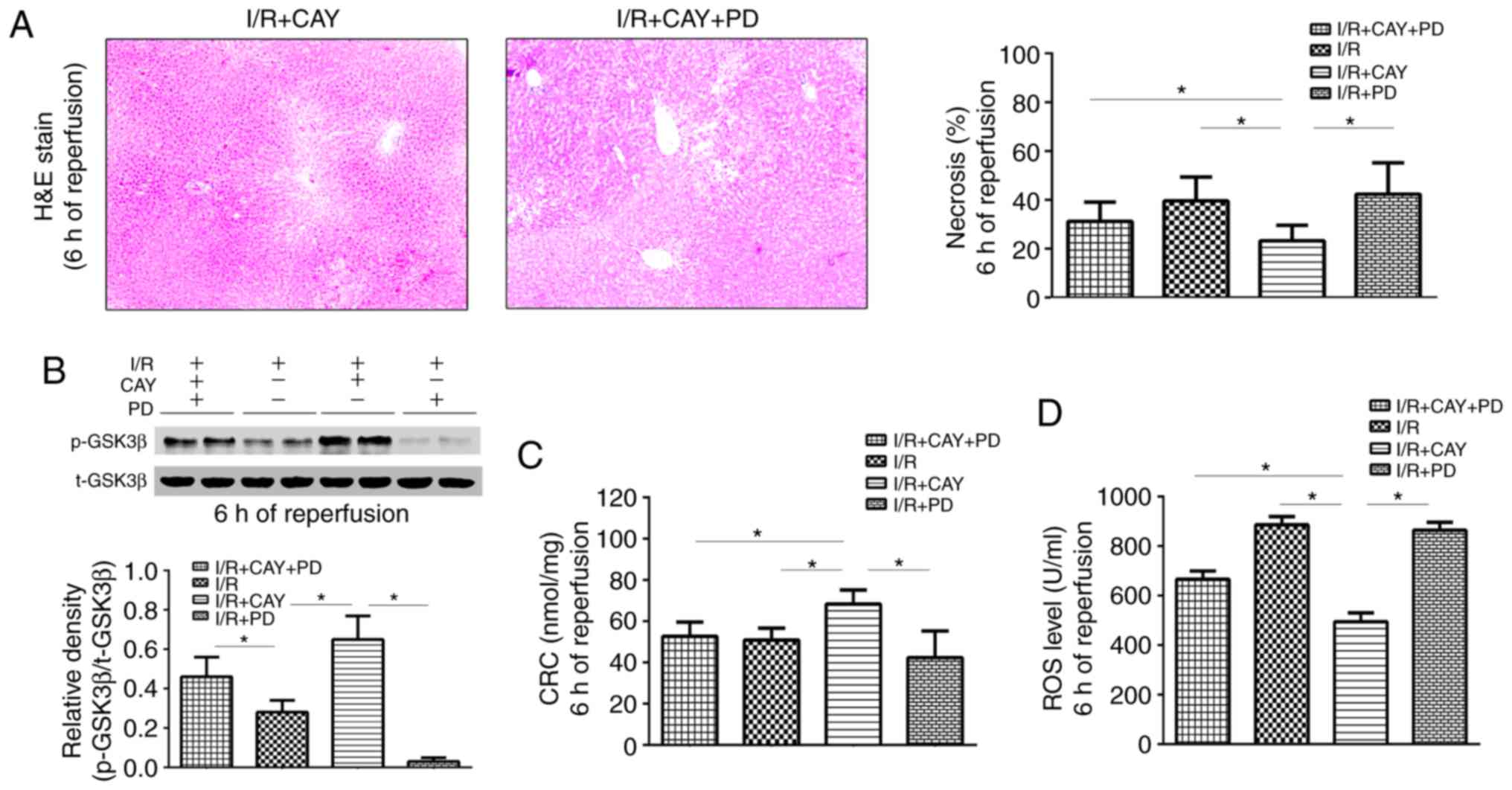|
1
|
Howard TK, Klintmalm GB, Cofer JB, Husberg
BS, Goldstein RM and Gonwa TA: The influence of preservation injury
on rejection in the hepatic transplant recipient. Transplantation.
49:103–107. 1990. View Article : Google Scholar : PubMed/NCBI
|
|
2
|
Halestrap AP: What is the mitochondrial
permeability transition pore? J Mol Cell Cardiol. 46:821–831. 2009.
View Article : Google Scholar : PubMed/NCBI
|
|
3
|
Zhu J, Rebecchi MJ, Glass PS, Brink PR and
Liu L: Cardioprotection of the aged rat heart by GSK-3beta
inhibitor is attenuated: Age-related changes in mitochondrial
permeability transition pore modulation. Am J Physiol Heart Circ
Physiol. 300:H922–H930. 2011. View Article : Google Scholar : PubMed/NCBI
|
|
4
|
Fu H, Xu H, Chen H, Li Y, Li W, Zhu Q,
Zhang Q, Yuan H, Liu F, Wang Q, et al: Inhibition of glycogen
synthase kinase 3 ameliorates liver ischemia/reperfusion injury via
an energy-dependent mitochondrial mechanism. J Hepatol. 61:816–824.
2014. View Article : Google Scholar : PubMed/NCBI
|
|
5
|
Gomez L, Paillard M, Thibault H, Derumeaux
G and Ovize M: Inhibition of GSK3beta by postconditioning is
required to prevent opening of the mitochondrial permeability
transition pore during reperfusion. Circulation. 117:2761–2768.
2008. View Article : Google Scholar : PubMed/NCBI
|
|
6
|
Boengler K, Hilfiker-Kleiner D, Heusch G
and Schulz R: Inhibition of permeability transition pore opening by
mitochondrial STAT3 and its role in myocardial
ischemia/reperfusion. Basic Res Cardiol. 105:771–785. 2010.
View Article : Google Scholar : PubMed/NCBI
|
|
7
|
Fu H, Chen H, Wang C, Xu H, Liu F, Guo M,
Wang Q and Shi X: Flurbiprofen, a cyclooxygenase inhibitor,
protects mice from hepatic ischemia/reperfusion injury by
inhibiting GSK-3β signaling and mitochondrial permeability
transition. Mol Med. 18:1128–1135. 2012. View Article : Google Scholar : PubMed/NCBI
|
|
8
|
Kwak HJ, Park KM, Choi HE, Lim HJ, Park JH
and Park HY: The cardioprotective effects of zileuton, a
5-lipoxygenase inhibitor, are mediated by COX-2 via activation of
PKC delta. Cell Signal. 22:80–87. 2010. View Article : Google Scholar
|
|
9
|
Hwang HS, Yang KJ, Park KC, Choi HS, Kim
SH, Hong SY, Jeon BH, Chang YK, Park CW, Kim SY, et al:
Pretreatment with paricalcitol attenuates inflammation in
ischemia-reperfusion injury via the up-regulation of
cyclooxygenase-2 and prostaglandin E2. Nephrol Dial Transplant.
28:1156–1166. 2013. View Article : Google Scholar
|
|
10
|
Ho ATV, Palla AR, Blake MR, Yucel ND, Wang
YX, Magnusson KEG, Holbrook CA, Kraft PE, Delp SL and Blau HM:
Prostaglandin E2 is essential for efficacious skeletal muscle
stem-cell function, augmenting regeneration and strength. Proc Natl
Acad Sci USA. 114:6675–6684. 2017.PubMed/NCBI
|
|
11
|
Narumiya S and FitzGerald GA: Genetic and
pharmacological analysis of prostanoid receptor function. J Clin
Invest. 108:25–30. 2001. View Article : Google Scholar : PubMed/NCBI
|
|
12
|
Kuzumoto Y, Sho M, Ikeda N, Hamada K,
Mizuno T, Akashi S, Tsurui Y, Kashizuka H, Nomi T, Kubo A, et al:
Significance and therapeutic potential of prostaglandin E2 receptor
in hepatic ischemia/reperfusion injury in mice. Hepatology.
42:608–617. 2005. View Article : Google Scholar : PubMed/NCBI
|
|
13
|
Nataraj C, Thomas DW, Tilley SL, Nguyen
MT, Mannon R, Koller BH and Coffman TM: Receptors for prostaglandin
E(2) that regulate cellular immune responses in the mouse. J Clin
Invest. 108:1229–1235. 2001. View Article : Google Scholar : PubMed/NCBI
|
|
14
|
Konya V, Marsche G, Schuligoi R and
Heinemann A: E-type prostanoid receptor 4 (EP4) in disease and
therapy. Pharmacol Ther. 138:485–502. 2013. View Article : Google Scholar : PubMed/NCBI
|
|
15
|
Liang X, Lin L, Woodling NS, Wang Q,
Anacker C, Pan T, Merchant M and Andreasson K: Signaling via the
prostaglandin E(2) receptor EP4 exerts neuronal and vascular
protection in a mouse model of cerebral ischemia. J Clin Invest.
121:4362–4371. 2011. View Article : Google Scholar : PubMed/NCBI
|
|
16
|
Pang L, Cai Y, Tang EH, Irwin MG, Ma H and
Xia Z: Prostaglandin E receptor subtype 4 signaling in the heart:
Role in ischemia/reperfusion injury and cardiac hypertrophy. J
Diabetes Res. 2016:13243472016. View Article : Google Scholar : PubMed/NCBI
|
|
17
|
Mo C, Zhao R, Vallejo J, Igwe O, Bonewald
L, Wetmore L and Brotto M: Prostaglandin E2 promotes proliferation
of skeletal muscle myoblasts via EP4 receptor activation. Cell
Cycle. 14:1507–1516. 2015. View Article : Google Scholar : PubMed/NCBI
|
|
18
|
Naribayashi-Inomoto Y, Ding M, Nakata H,
Narumiya S, Sugimoto Y, Honda A, Ichikawa A, Chiba T and Kinoshita
Y: Copresence of prostaglandin EP2 and EP3 receptors on gastric
enterochromaffin-like cell carcinoid in African rodents.
Gastroenterology. 109:341–347. 1995. View Article : Google Scholar : PubMed/NCBI
|
|
19
|
Nishizawa N, Ito Y, Eshima K, Ohkubo H,
Kojo K, Inoue T, Raouf J, Jakobsson PJ, Uematsu S, Akira S, et al:
Inhibition of microsomal prostaglandin E synthase-1 facilitates
liver repair after hepatic injury in mice. J Hepatol. 69:110–120.
2018. View Article : Google Scholar : PubMed/NCBI
|
|
20
|
Nakamura K, Kageyama S, Ito T, Hirao H,
Kadono K, Aziz A, Dery KJ, Everly MJ, Taura K, Uemoto S, et al:
Antibiotic pretreatment alleviates liver transplant damage in mice
and humans. J Clin Invest. 129:3420–3434. 2019. View Article : Google Scholar : PubMed/NCBI
|
|
21
|
Selzner N, Selzner M, Jochum W and Clavien
PA: Ischemic preconditioning protects the steatotic mouse liver
against reperfusion injury: An ATP dependent mechanism. J Hepatol.
39:55–61. 2003. View Article : Google Scholar : PubMed/NCBI
|
|
22
|
Liu A, Dirsch O, Fang H, Dong W, Jin H,
Huang H, Sun J and Dahmen U: HMGB1 translocation and expression is
caused by warm ischemia reperfusion injury, but not by partial
hepatectomy in rats. Exp Mol Pathol. 91:502–508. 2011. View Article : Google Scholar : PubMed/NCBI
|
|
23
|
Yamada F, Saito T, Abe T, Tsuchiya T, Sato
Y, Kenjo A, Kimura T and Gotoh M: Ischemic preconditioning enhances
regenerative capacity of hepatocytes in long-term ischemically
damaged rat livers. J Gastroenterol Hepatol. 22:1971–1977. 2007.
View Article : Google Scholar : PubMed/NCBI
|
|
24
|
Limani P, Linecker M, Oberkofler CE,
Barmettler G, Kaech A, Graf R, Humar B and Clavien PA: Remote
ischemic preconditioning: A novel strategy in rescuing older livers
from ischemia-reperfusion injury in a rodent model. Ann Surg.
264:797–803. 2016. View Article : Google Scholar : PubMed/NCBI
|
|
25
|
Yamamoto M, Morita T, Ishikawa M and
Sakamoto A: Specific microRNAs are involved in the renoprotective
effects of sevoflurane preconditioning and ischemic preconditioning
against ischemia reperfusion injury in rats. Int J Mol Med.
45:1141–1149. 2020.PubMed/NCBI
|
|
26
|
Parks RJ, Murphy E and Liu JC:
Mitochondrial permeability transition pore and calcium handling.
Methods Mol Biol. 1782:187–196. 2018. View Article : Google Scholar : PubMed/NCBI
|
|
27
|
Ichas F, Jouaville LS, Sidash SS, Mazat JP
and Holmuhamedov EL: Mitochondrial calcium spiking: A transduction
mechanism based on calcium-induced permeability transition involved
in cell calcium signalling. FEBS Lett. 348:211–215. 1994.
View Article : Google Scholar : PubMed/NCBI
|
|
28
|
Novgorodov SA, Gudz TI, Kushnareva YE,
Zorov DB and Kudrjashov YB: Effect of ADP/ATP antiporter
conformational state on the suppression of the nonspecific
permeability of the inner mitochondrial membrane by cyclosporine A.
FEBS Lett. 277:123–126. 1990. View Article : Google Scholar : PubMed/NCBI
|
|
29
|
Barry SP, Townsend PA, Latchman DS and
Stephanou A: Role of the JAK-STAT pathway in myocardial injury.
Trends Mol Med. 13:82–89. 2007. View Article : Google Scholar
|
|
30
|
Juhaszova M, Zorov DB, Kim SH, Pepe S, Fu
Q, Fishbein KW, Ziman BD, Wang S, Ytrehus K, Antos CL, et al:
Glycogen synthase kinase-3beta mediates convergence of protection
signaling to inhibit the mitochondrial permeability transition
pore. J Clin Invest. 113:1535–1549. 2004. View Article : Google Scholar : PubMed/NCBI
|
|
31
|
Cai L, Li Y, Zhang Q, Sun H, Yan X, Hua T,
Zhu Q, Xu H and Fu H: Salidroside protects rat liver against
ischemia/reperfusion injury by regulating the GSK-3β/Nrf2-dependent
antioxidant response and mitochondrial permeability transition. Eur
J Pharmacol. 806:32–42. 2017. View Article : Google Scholar : PubMed/NCBI
|
|
32
|
Song JQ, Teng X, Cai Y, Tang CS and Qi YF:
Activation of Akt/GSK-3beta signaling pathway is involved in
intermedin(1-53) protection against myocardial apoptosis induced by
ischemia/reperfusion. Apoptosis. 14:1061–1069. 2009. View Article : Google Scholar : PubMed/NCBI
|
|
33
|
Nishino Y, Webb IG, Davidson SM, Ahmed AI,
Clark JE, Jacquet S, Shah AM, Miura T, Yellon DM, Avkiran M and
Marber MS: Glycogen synthase kinase-3 inactivation is not required
for ischemic preconditioning or postconditioning in the mouse. Circ
Res. 103:307–314. 2008. View Article : Google Scholar : PubMed/NCBI
|
|
34
|
Qu W, Graves LM and Thurman RG: PGE(2)
stimulates O(2) uptake in hepatic parenchymal cells: Involvement of
the cAMP-dependent protein kinase. Am J Physiol. 277:G1048–G1054.
1999.PubMed/NCBI
|
|
35
|
Billot X, Chateauneuf A, Chauret N, Denis
D, Greig G, Mathieu MC, Metters KM, Slipetz DM and Young RN:
Discovery of a potent and selective agonist of the prostaglandin
EP4 receptor. Bioorg Med Chem Lett. 13:1129–1132. 2003. View Article : Google Scholar : PubMed/NCBI
|
|
36
|
Luo R, Kakizoe Y, Wang F, Fan X, Hu S,
Yang T, Wang W and Li C: Deficiency of mPGES-1 exacerbates renal
fibrosis and inflammation in mice with unilateral ureteral
obstruction. Am J Physiol Renal Physiol. 312:F121–F133. 2017.
View Article : Google Scholar
|
|
37
|
Carboneau BA, Allan JA, Townsend SE,
Kimple ME, Breyer RM and Gannon M: Opposing effects of
prostaglandin E2 receptors EP3 and EP4 on mouse and human β-cell
survival and proliferation. Mol Metab. 6:548–559. 2017. View Article : Google Scholar : PubMed/NCBI
|
|
38
|
Quan Y, Jiang J and Dingledine R: EP2
receptor signaling path-ways regulate classical activation of
microglia. J Biol Chem. 288:9293–9302. 2013. View Article : Google Scholar : PubMed/NCBI
|
|
39
|
Wang F, Lu X, Peng K, Du Y, Zhou SF, Zhang
A and Yang T: Prostaglandin E-prostanoid4 receptor mediates
angiotensin II-induced (pro)renin receptor expression in the rat
renal medulla. Hypertension. 64:369–377. 2014. View Article : Google Scholar : PubMed/NCBI
|
|
40
|
Machado-Carvalho L, Torres R,
Perez-Gonzalez M, Alobid I, Mullol J, Pujols L, Roca-Ferrer J and
Picado C: Altered expression and signalling of EP2 receptor in
nasal polyps of AERD patients: Role in inflammation and
remodelling. Rhinology. 54:254–265. 2016. View Article : Google Scholar : PubMed/NCBI
|
|
41
|
Tanaka T, Saotome M, Katoh H, Satoh T,
Hasan P, Ohtani H, Satoh H, Hayashi H and Maekawa Y: Glycogen
synthase kinase-3β opens mitochondrial permeability transition pore
through mitochondrial hexokinase II dissociation. J Physiol Sci.
68:865–871. 2018. View Article : Google Scholar : PubMed/NCBI
|
|
42
|
Miura T and Tanno M: Mitochondria and
GSK-3beta in cardio-protection against ischemia/reperfusion injury.
Cardiovasc Drugs Ther. 24:255–263. 2010. View Article : Google Scholar : PubMed/NCBI
|
|
43
|
Bolli R, Dawn B and Xuan YT: Role of the
JAK-STAT pathway in protection against myocardial
ischemia/reperfusion injury. Trends Cardiovasc Med. 13:72–79. 2003.
View Article : Google Scholar : PubMed/NCBI
|
|
44
|
Gracia-Sancho J, Casillas-Ramirez A and
Peralta C: Molecular pathways in protecting the liver from
ischaemia/reperfusion injury: A 2015 update. Clin Sci (Lond).
129:345–362. 2015. View Article : Google Scholar
|
|
45
|
Izuishi K, Tsung A, Hossain MA, Fujiwara
M, Wakabayashi H, Masaki T, Billiar TR and Maeta H: Ischemic
preconditioning of the murine liver protects through the Akt kinase
pathway. Hepatology. 44:573–580. 2006. View Article : Google Scholar : PubMed/NCBI
|
|
46
|
Cao CM, Zhang Y, Weisleder N, Ferrante C,
Wang X, Lv F, Zhang Y, Song R, Hwang M, Jin L, et al: MG53
constitutes a primary determinant of cardiac ischemic
preconditioning. Circulation. 121:2565–2574. 2010. View Article : Google Scholar : PubMed/NCBI
|
|
47
|
Centurion SA, Centurion LM, Souza ME,
Gomes MC, Sankarankutty AK, Mente ED and Castro e Silva O: Effects
of ischemic liver preconditioning on hepatic ischemia/reperfusion
injury in the rat. Transplant Proc. 39:361–364. 2007. View Article : Google Scholar : PubMed/NCBI
|
|
48
|
Varela AT, Simoes AM, Teodoro JS, Duarte
FV, Gomes AP, Palmeira CM and Rolo AP: Indirubin-3′-oxime prevents
hepatic I/R damage by inhibiting GSK-3beta and mitochondrial
perme-ability transition. Mitochondrion. 10:456–463. 2010.
View Article : Google Scholar : PubMed/NCBI
|
|
49
|
Beurel E, Grieco SF and Jope RS: Glycogen
synthase kinase-3 (GSK3): Regulation, actions, and diseases.
Pharmacol Ther. 148:114–131. 2015. View Article : Google Scholar
|
|
50
|
Gross ER, Hsu AK and Gross GJ: GSK3beta
inhibition and K(ATP) channel opening mediate acute opioid-induced
cardio-protection at reperfusion. Basic Res Cardiol. 102:341–349.
2007. View Article : Google Scholar : PubMed/NCBI
|
|
51
|
Gross ER, Hsu AK and Gross GJ: The
JAK/STAT pathway is essential for opioid-induced cardioprotection:
JAK2 as a mediator of STAT3, Akt, and GSK-3 beta. Am J Physiol
Heart Circ Physiol. 291:H827–H834. 2006. View Article : Google Scholar : PubMed/NCBI
|
|
52
|
Lecour S: Activation of the protective
survivor activating factor enhancement (SAFE) pathway against
reperfusion injury: Does it go beyond the RISK pathway? J Mol Cell
Cardiol. 47:32–40. 2009. View Article : Google Scholar : PubMed/NCBI
|
|
53
|
Wang Y, Shen J, Xiong X, Xu Y, Zhang H,
Huang C, Tian Y, Jiao C, Wang X and Li X: Remote ischemic
preconditioning protects against liver ischemia-reperfusion injury
via heme oxygenase-1-induced autophagy. PLoS One. 9:e988342014.
View Article : Google Scholar : PubMed/NCBI
|
|
54
|
Yang J, Wang Y, Sui M, Liu F, Fu Z and
Wang QX: Tri-iodothyronine preconditioning protects against liver
ischemia reperfusion injury through the regulation of autophagy by
the MEK/ERK/mTORC1 axis. Biochem Biophys Res Commun. 467:704–710.
2015. View Article : Google Scholar : PubMed/NCBI
|
|
55
|
Yu J, Wang L, Akinyi M, Li Y, Duan Z, Zhu
Y and Fan G: Danshensu protects isolated heart against ischemia
reperfusion injury through activation of Akt/ERK1/2/Nrf2 signaling.
Int J Clin Exp Med. 8:14793–14804. 2015.PubMed/NCBI
|















